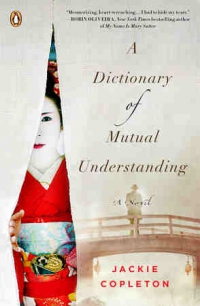A Dictionary of Mutual Understanding by Jackie Copleton
 Wednesday, March 9, 2016 at 9:28AM
Wednesday, March 9, 2016 at 9:28AM 
First published in Great Britain; published by Penguin Books on December 1, 2015
A Dictionary of Mutual Understanding is a surprisingly affecting story about love, loss, regret, and redemption in Japan before and after World War II. Much of the story takes place in the aftermath of the Nagasaki bombing. Two unconventional love stories (one a forbidden love, the other an arranged marriage) are told in letters and journals from the past. The central character in the present has lost everyone she loved until someone surfaces in her life who may or may not be her lost grandson.
Haunted by the death of her daughter Yuko in Nagasaki, Amaterasu Takahashi does not believe the scarred man who appears at her door is really her grandson Hideo. Amaterasu moved to the United States with her husband in the 1950s. Even before her husband died, Amaterasu lived a deliberately isolated life, refusing to learn English, sheltering herself from the loss of daughter and grandson, wanting no connection to people who were not her own. It is also her way of coping with the guilt that comes from her belief that she could have saved Hideo, and perhaps Yuko.
A key to Amaterasu's sense of guilt is Yuko’s first lover, a physician named Sato who cannot escape the memories of his experiences in China. At different times and for different reasons, Sato is haunted by the loss of Yuko. There is more to Sato’s story, as we learn in the novel’s second half.
Amaterasu decides that she can only understand the present (and the sudden appearance of a man who claims to be Hideo) by breaking her vow never to read Yuko’s diaries. The diaries reveal Yuko’s life to the reader and to Yuko’s mother. Amaterasu knew some of the details, and in fact credits herself for saving Yuko from “the folly of romance.” But reading about Yuko’s life from Yuko’s perspective brings fresh insight and pain as it triggers memories of Amaterasu’s young life.
There is, in fact, a good bit of pain in this novel. Jackie Copleton’s description of pikadon, the bombing of Nagasaki, is intense and painfully sad. Scenes depicting Japanese atrocities visited upon Chinese civilians (particularly the use of living patients for surgical training) are difficult to read. Yuko and her mother both know the pain of impossible romance.
At the same time, the novel is very much a story of rebirth, with regard both to the characters and Nagasaki itself. It is a story of change and forgiveness and making peace with the past, on both an individual and a global level.
In elegant prose, A Dictionary of Mutual Understanding tells a dramatic story of loss that occasionally borders upon, but never descends into, melodrama. Each chapter begins with a definition/explanation of a Japanese word that is important to Japanese culture. Many of those concepts illuminate not just the story of Japan, but the stories of Amaterasu and Yuko. It is a fitting device that helps the reader better understand the characters and the culture into which they were born.
RECOMMENDED